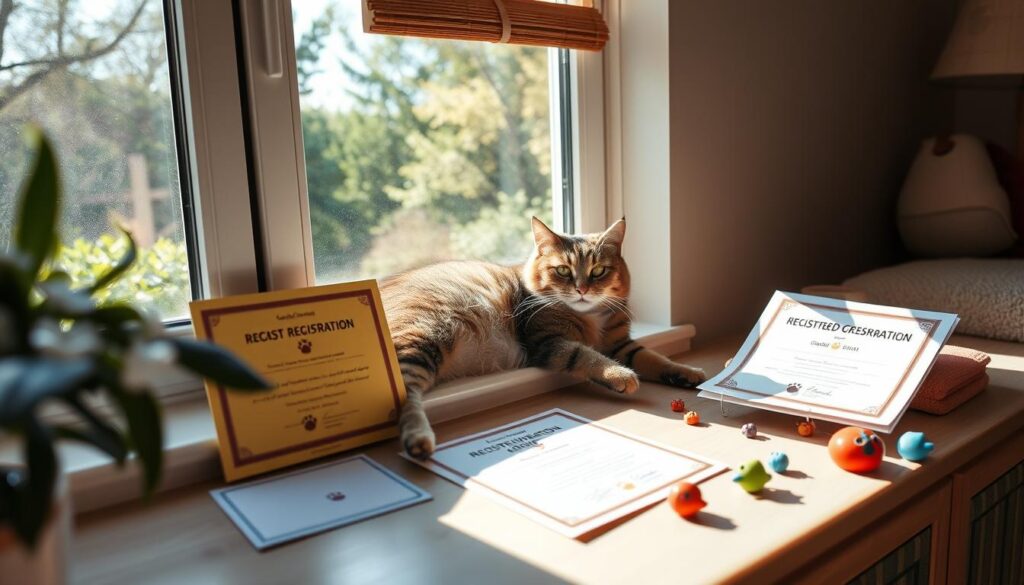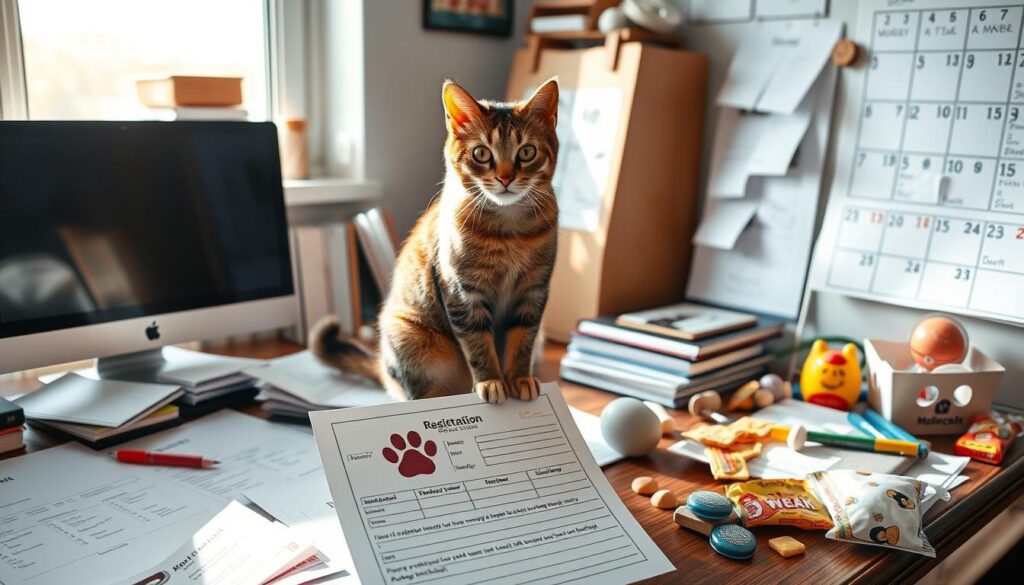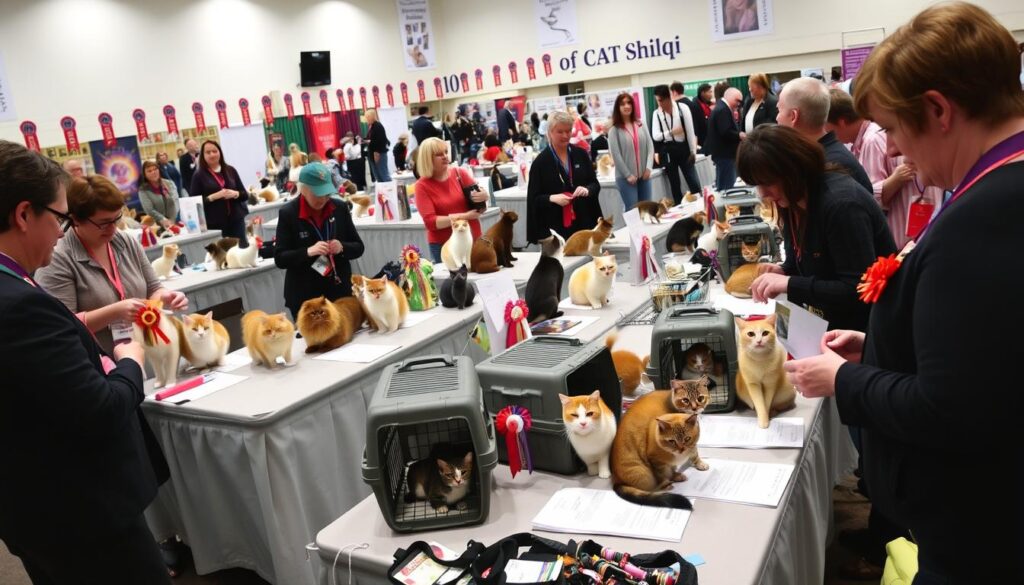Every cat lover knows the special bond between humans and cats. When I first learned about cats direct registering, it felt like discovering a secret language. This language is all about feline movement and precision.
Direct registering is a cool technique that shows off cats‘ unique walking style. It lets them place their back paws exactly where their front paws were. This makes their movement both efficient and sneaky, something animal experts have found fascinating for years.
Feline registration is more than just tracking. It’s a complex system that shows how adaptable and precise cats are. Whether you love cats or just find them interesting, learning about cats direct registering changes how you see them.
In this guide, we’ll dive into the world of feline registration. We’ll cover the techniques, benefits, and principles that make cats so special. You’ll learn about their hunting skills and how they move, deepening your connection with them.
Your adventure into cats direct registering begins here. It opens up a world of grace, efficiency, and natural smarts that cats possess.
Table of Contents
Understanding Cats Direct Registering
Cat registration is key for pet owners who care about domain cat names and online cat branding. It helps document your cat’s family tree, health, and special traits.

Direct registering is a precise way to track and identify cats. It involves documenting your cat’s unique features and genetic makeup through official channels.
What is Direct Registering?
Direct registering is more than just paperwork. It’s a detailed way to gather important info about your cat. This includes:
- Genetic lineage
- Breed-specific characteristics
- Health history
- Physical attributes
“Registration transforms your cat from just a pet to a documented and recognized individual in the feline community.”
Why Register Your Cat?
Registration has many benefits for cat owners who want to be responsible:
| Benefit | Description |
|---|---|
| Breeding Verification | Confirm purebred status and genetic heritage |
| Health Tracking | Maintain comprehensive medical records |
| Show Eligibility | Qualify for professional cat competitions |
Your cat’s registration opens doors to special communities. It formally recognizes your pet’s unique identity in the domain cat names world.
Interesting fact: Domestic cats typically have 18 toes – five on front paws and four on back paws – which can be meticulously documented during registration.
The Benefits of Cats Direct Registering
Registering your cat brings many benefits beyond just paperwork. For those looking into kitty website names and registration, knowing these perks can make owning a pet better.

Proven Breeding Standards
Direct registration means your cat meets top quality standards. Registries check breeding lines for health and breed traits.
- Validates genetic lineage
- Confirms breed authenticity
- Prevents unethical breeding practices
Health Record Maintenance
Direct registration keeps your cat’s health history organized. This helps vets give better care.
“A well-documented pet is a healthier pet.” – Veterinary Professionals Association
Access to Exclusive Events
Registration lets you join fun events in the furry friend world. You can go to cat shows, breeding conferences, and more.
- Professional cat shows
- Breeder symposiums
- Specialized training workshops
By choosing direct registration, you’re not just recording your cat’s details. You’re also boosting their future and connecting with fellow cat lovers.
How to Begin the Registration Process
Registering your cat needs careful planning and knowing the steps. Cat owners can make the process easier by getting the right documents and choosing the right registry. Websites focused on cats can guide you through this.

Gathering Necessary Documents
Before you start your cat’s registration, you’ll need certain documents. The steps vary based on your situation.
- Breeder Slip Registration: Can be completed within seconds
- Non-Breeder Slip Registration: Requires two key documents
- Pedigree scan
- Proof of ownership document
- Individual Cat Registration Form requirements:
- Pedigree with three full generations of ancestors
- Breeder’s signed documentation
Choosing the Right Registry
Picking a good cat registry is key for proper documentation and recognition. The International Cat Association (TICA) is a top choice for many.
“Choosing the right registry is like finding the perfect home for your cat’s official identity.”
| Registration Method | Processing Time | Required Documents |
|---|---|---|
| Breeder Slip | Instant | Breeder Slip |
| Individual Registration | Executive Office Review | Pedigree, Ownership Proof |
Cat-focused websites offer detailed guides for each step of registration. Creating a free account on the platform is the first step for all types. The system lets you track your progress through a user’s case management system.
Key Factors to Consider When Registering
Registering your cat online requires attention to detail. Knowing the important factors can help your cat’s registration go smoothly.

When you’re ready to register your cat, several things are important. It’s not just about paperwork. It’s about making sure your cat meets certain standards.
Breed-Specific Regulations
Each cat breed has its own rules for registration. Here are some key things to remember:
- Genetic documentation requirements
- Breed-specific health certifications
- Lineage verification processes
“Know your breed’s specific requirements before beginning the registration process.”
Ownership Limitations
Registration isn’t just about your cat. Registries often have rules for cat owners:
- Maximum number of cats per household
- Restrictions on breeding rights
- Local regulatory constraints
These rules can affect your cat’s online presence. Accurate and up-to-date information is crucial to avoid problems later.
Professional cat registries need detailed documents, including:
- Detailed health records
- Verified genetic background
- Proof of ownership
By understanding these factors, you can register your cat easily. This protects you and your cat.
Common Misconceptions About Direct Registering
Understanding feline registration can be tricky for cat owners. Many get confused about pet domain names and the registration process. Let’s debunk some common myths about direct registering your cat.

Temporary vs. Permanent Registration
One big misunderstanding is about how long cat registration lasts. Direct registering is not temporary. It gives your cat a permanent record, offering benefits and protection for life.
- Permanent registration creates a lasting identification for your cat
- Ensures continuous tracking of your pet’s lineage
- Provides ongoing health and breeding documentation
Understanding Registration Costs
The cost of feline registration often confuses people. While the initial fees might seem high, the long-term benefits usually make it worth it.
| Registration Type | Average Cost | Included Benefits |
|---|---|---|
| Basic Registration | $45-$75 | Microchip, Basic Health Record |
| Comprehensive Registration | $100-$150 | Detailed Lineage, Show Eligibility |
“Investing in proper registration is investing in your cat’s future health and identity.”
Pet domain names and registration are more than just paperwork. They show a commitment to responsible pet care. They provide vital info that can help find lost cats and reunite them with their families.
- Registration increases chances of pet recovery
- Provides proof of ownership
- Supports broader pet management systems
The Role of Registration Organizations
Exploring domain cat names and online cat branding? Knowing about registration organizations is key. These groups help keep breed standards high and add credibility for cat owners and breeders.
Cat registration organizations are official places that check and record breed traits, family history, and who owns the cat. They do more than just keep records.
Popular Cat Registries in the U.S.
In the U.S., there are many well-known cat registries. They help prove your cat’s identity. Some top ones are:
- The International Cat Association (TICA)
- Cat Fanciers’ Association (CFA)
- American Cat Fanciers Association (ACFA)
Differences Between Registries
Each registry has its own special features. These can affect your cat’s registration and show chances. Here are some main differences:
| Registry | Breed Recognition | Show Participation |
|---|---|---|
| TICA | Most progressive breed recognition | International show circuits |
| CFA | Conservative breed standards | Strict show qualifications |
| ACFA | Moderate breed acceptance | Flexible show rules |
When picking a registry for your cat’s online branding, look into each one’s rules. Your choice can really affect your cat’s future in breeding and shows.
“Choosing the right registry is like finding the perfect home for your cat’s pedigree.” – Cat Breeding Expert
Remember, registration is more than just paperwork. It’s about making your cat’s unique identity and heritage known in the world of cats.
Maintaining Your Cat’s Registration Status

Keeping your cat’s registration up to date is key for responsible pet ownership. It’s more than a piece of paper; it’s a vital link to your pet. Keeping it current ensures your pet stays safe and protected.
Updating your cat’s registration involves several important steps. Pet owners should follow these carefully:
- Review registration details annually
- Update contact information promptly
- Verify microchip contact details
- Maintain current health records
Updating Your Cat’s Information
Having accurate registration data is crucial. Approximately 80% of lost pet cats are found within a one-mile radius of their home. So, keeping your contact info up to date is essential. If you move, change your phone number, or your cat’s health changes, tell your registration organization right away.
“A microchip is your pet’s permanent ticket home” – Veterinary Experts
Renewal Requirements
Most cat registries need you to renew your cat’s status periodically. Renewals usually involve:
- Submitting updated medical records
- Paying annual registration fees
- Confirming current ownership details
- Providing proof of vaccinations
By staying on top of your cat’s registration, you ensure their safety. With over 24Petwatch reuniting 730,000 lost pets, keeping your registration current could be the difference in bringing your cat home if they get lost.
Potential Challenges in the Registration Process
Getting your cat registered can be tough. Websites for cat lovers and breeders help a lot. But, knowing the possible problems can make things easier.

Document Verification Complexities
Registration papers need careful checking. Mistakes in these documents can stop your cat’s registration. Common problems include:
- Illegible photographs
- Missing genetic testing records
- Incomplete breed documentation
- Insufficient health certification
Understanding Potential Denial Cases
Registration can be denied for many reasons. Registries have high standards to protect breeds and animals.
| Reason for Denial | Potential Resolution |
|---|---|
| Genetic Defects | Additional health screenings |
| Incomplete Lineage Documentation | Trace and submit comprehensive ancestry records |
| Non-Compliance with Breed Standards | Consult breed experts for guidance |
“Preparation and attention to detail are your best allies in the cat registration process.” – Feline Registration Expert
When looking at cat websites, check the registry rules well. Each one has its own rules. So, being well-prepared is key for a smooth registration.
How Direct Registering Affects Cat Shows
Cat shows are a lively place where cat lovers show off their pets’ special traits. Direct registering is key to a cat’s chance to win in these events.

Professional cat shows need detailed records of a cat’s family tree and features. Your cat’s direct registering status is very important for entering these competitions.
Eligibility Criteria for Cat Shows
To join top cat shows, owners must meet certain rules:
- Provide full breed documents
- Show a verified online presence for cats
- Submit detailed health records
- Pay the needed registration fees
Benefits for Show Participants
Registered cats get big benefits in competitions:
- Entry to special show circuits
- Chances to win championships
- More respect from breed fans
- More chances to meet others
“Registration turns your cat into a potential champion.” – Professional Cat Show Judge
How you handle your cat’s direct registering can really improve your show experience. Professional groups look at many things to make sure shows are fair and fun.
| Registration Level | Show Eligibility | Potential Awards |
|---|---|---|
| Basic | Local Shows | Participation Certificates |
| Advanced | Regional Competitions | Merit Ribbons |
| Premium | National Championships | Top Breed Titles |
Knowing about these detailed registration steps helps cat owners do their best in shows. It lets them celebrate their cat’s special qualities.
The Importance of Ethical Considerations
Being a responsible cat owner means more than just loving your pet. It’s about making choices that protect cats everywhere. When you think about feline registration, it’s important to understand the big picture.
Good breeding practices keep cats healthy and happy. Using the right pet domain names and registration helps keep animals safe from harm.
Avoiding Backdoor Breeders
Backdoor breeders are a big problem for cats. They care more about money than the cats’ well-being. Here’s how to spot them:
- They don’t want to show you where they breed
- They don’t have health records
- They don’t do genetic tests
- They have too many kittens at once
Promoting Responsible Ownership
Being a good cat owner is more than just registering your cat. Here are some important things to remember:
- Take your cat to the vet regularly
- Feed them right and take care of them
- Know what health issues your cat’s breed might have
- Always think about your cat’s well-being for their whole life
*Ethical breeding is not just a choice—it’s a commitment to the health and happiness of our feline companions.*
Numbers show why we need to think about ethics. Every year, 3.2 million cats go to shelters, and 530,000 are put down. By choosing wisely in feline registration, you can help lower these numbers.
Your actions can really help cats all over the United States.
Case Studies: Success Stories of Direct Registering
Direct cat registering is a game-changer for breeders and pet owners. It boosts their domain cat names and online cat branding. Real stories show how professional registration can change the game.
Notable Breeders’ Testimonials
Professional cat breeders have found big wins with direct registering. They’ve seen many benefits:
- Enhanced breeding program credibility
- Improved genetic tracking
- Access to exclusive breeding networks
“Registration isn’t just paperwork—it’s a commitment to quality and responsible breeding.” – Sarah Reynolds, Professional Cat Breeder
Happy Pet Owners’ Experiences
Pet owners who register their cats directly get big perks. They can track their cat’s health and lineage. This gives them detailed records for caring for their pets long-term.
| Registration Benefit | Owner Impact |
|---|---|
| Health Record Maintenance | Comprehensive Medical Tracking |
| Breed Verification | Authentic Lineage Confirmation |
| Show Eligibility | Competitive Performance Opportunities |
By choosing direct cat registration, you open doors to professional recognition. You also get better breeding standards and detailed pet records.
Resources for Further Information
Exploring cat registration can seem daunting. But, many resources are available to guide you. Whether you’re new to cat ownership or a seasoned breeder, it’s key to understand the process.
Start your journey by checking out reliable online and print resources. They offer deep insights into the world of cat registration.
Online Registries to Explore
- The International Cat Association (TICA)
- Cat Fanciers’ Association (CFA)
- American Cat Fanciers Association (ACFA)
- American Association of Cat Enthusiasts (AACE)
Recommended Reading Materials
Boost your knowledge with these must-read books and publications:
- “The Complete Cat Breed Book” – A detailed guide to cat breeds and registration
- “Breeding and Showing Cats: A Professional’s Approach”
- Cat Fancy Magazine
- Purebred Cat Breed Journals
“Knowledge is the key to successful cat registration and responsible ownership.” – Feline Expert
Digital Learning Platforms
| Platform | Focus Area | Cost |
|---|---|---|
| Udemy Cat Courses | Breed Registration | Varies |
| Coursera Animal Studies | Feline Genetics | Free/Paid |
| LinkedIn Learning | Professional Cat Breeding | Subscription |
By using these resources, you’ll learn a lot about cat registration, breeding, and networking in the feline world.
Conclusion: Your Next Steps in Cats Direct Registering
Starting your cat’s registration journey is more than just filling out forms. You’ll find lots of helpful websites and resources for your cat. This step also opens up new opportunities for your cat’s health and show career.
Getting the right documents and choosing a good registry makes things easier. It’s important for both breeders and pet owners. Research different registries to find the best one for your needs.
Registering your cat is a big step for their future. With the right preparation, you’ll get through it without trouble. Use online tools, talk to experienced breeders, and keep up with new rules.
Registering your cat is more than just paperwork. It’s about celebrating what makes your cat special. By doing this, you show you care about your pet and join a community of cat lovers.

